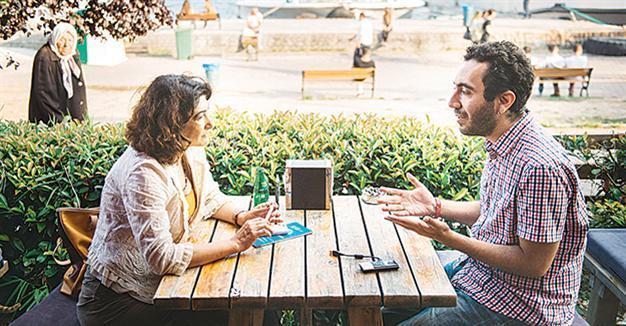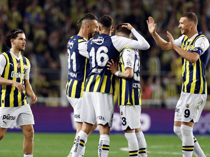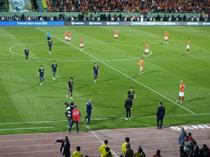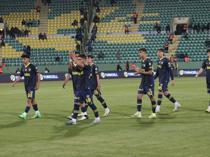Turkish football reflects the current mood in Turkey
Barçın Yinanç - barcin.yinanc@hdn.com.tr
 The Turkish national team made an early exit from the UEFA Euro 2016 tournament, which ended last weekend, highlighting the deep-rooted problems in the Turkish football industry. “Turkish football reflects the current mood in Turkey. It suffers from the same short-sighted policies that are valid in many spheres in Turkey,” said Çetin Cem Yılmaz, a UEFA.com writer who went to France to cover the Turkish team.
The Turkish national team made an early exit from the UEFA Euro 2016 tournament, which ended last weekend, highlighting the deep-rooted problems in the Turkish football industry. “Turkish football reflects the current mood in Turkey. It suffers from the same short-sighted policies that are valid in many spheres in Turkey,” said Çetin Cem Yılmaz, a UEFA.com writer who went to France to cover the Turkish team.UEFA 2016 has ended, leaving a bitter taste among Turks, I suppose, as the Turkish squad did not perform well.
Of the 24 teams (in the tournament) only eight teams were not able to make it to the next round, so it’s impossible to say it was a good performance. Maybe it could have been said that Turkey was in a difficult group with Croatia and Spain. Defeats against them could be understood, but in the end when you look at the results you are out after three games.
Turkey’s failure goes deeper than that. Turkey finished the first two games without a goal and conceded four goals. The first two games especially highlighted defensive problems, organizational and mental problems.
Tell us about your observations from France. How did the Turkish team fit in?
A: It’s an important subject. Turkey looked like the team that enjoyed being there the least. Members of the team did not give many interviews to the press, while the others were holding press conferences regularly. But Turkey, as well as few other ones, like Russia and Ukraine, avoided the press.
Also, players had lots of time off and while other players enjoyed the cities they were in, the Turkish squad did not go out at all. I wished they enjoyed the tournament more and that could have reflected better on the Turkish supporters too.
Fatih Terim, Turkey’s coach, said at the beginning, “This is a big stage. I want my players to show themselves.” Most of them will play in this tournament just once in their lives.
How were the Turkish supporters?
I think Turkey outnumbered the other (countries’) spectators. But while in the case of Croatia, for instance, there were more Turkish fans than Croatian fans, the latter were more organized with their songs and jerseys. And when you take a walk outside the stadium you would think there are 20,000 Croatians but only 3,000 Turks.
We don’t have many Turkish national team slogans. We have a couple of Galatasaray, Fenerbahçe and Beşiktaş chants tuned to the national theme. That’s one of the things with Turkey: We don’t have that much national team support. We have the support but it is not about fandom. Not many people just go and buy the (national team) jerseys.
That’s one of the reasons the games of the national team started to be played in Konya and Antalya. When it (a national team game) is in Istanbul, if the stadium is that of Galatasaray, for instance, the spectators would be Galatasaray fans.
What went wrong in France?
Fatih Terim put the blame on the players, saying not all of them played well. He was right in a way. Most of our star players did not have good seasons with their clubs. Arda Turan did not get much play time in Barcelona; Hakan Çalhanoğlu did not have his best season.
But I think as a team they also did not prepare very well. I don’t think Turkey played a cohesive game plan and they let their game plan be undone by Croatia too easily for instance and they could not respond to that.
Turkey had much better players than some of the other teams but the others succeeded because their team games were much better, like Hungary and Northern Ireland.
You said Turkey’s failures are deeper. Can you elaborate?
Turkey has been out of (international) tournaments since 2008. Before that our last tournament was 2002. Going to every other tournament every six years is not a good performance. We are the sixth (largest) football economy in Europe. We spend lots of money, we have good stadiums, we have expensive players, we have enormous interest in football and big passion for the (domestic) clubs but somehow we are not doing it right.
That’s because we are not doing it on the grassroots level. We are not using the money wisely. We should be focusing on raising more talent. Compared to the young population of 75 million, we have too few talents.
How come?
It is usually said that football schools and academies are not preparing players well for professional life. Young players who have talent are forced to choose between football and school. The system does not allow them to do both at the same time. We are not good at raising talent.
We keep getting Turkish players from Germany. Germans are better at raising talent from the 3 million Turks there than Turkey is from the 75 million Turks in the country. And you would think it is the same talent pool.
Another issue is that we don’t have many good trainers.
And it seems there is no strategy at hand to overcome these problems.
Fatih Terim, who is Turkey’s football director, keeps talking about the problems. Perhaps he might outline a plan after this tournament. But there is no coherent plan for the infrastructure. Many think that we might perhaps go once or twice more to (international) tournaments, but for the next 10 years after that there are no new talents coming and Turkey might stay away from international tournaments for some time.
Yet Turkey harbors well-established clubs that are quietly famous worldwide.
They are results-oriented and thus have daily strategies. Just as is the case with the Turkish economy, we cannot create added value to Turkish football. Fenerbahçe and Galatasaray have been sentenced because of their breach of financial fair play regulations. Their income is less than what they spend because they go after star players. But what they should do is to go after young talents and raise the next Arda Turan, or Ozan Tufan. They don’t do it. Why? Tell me which institution in Turkey works on a five- or 10-year plan basis? The Turkish people, fans as well, want success in the short term. No one is patient in Turkey.
Fatih Terim has the third highest income among the 24 countries’ coaches who attended the UEFA 2016 tournament. Is that normal?
Not so abnormal when you think about Turkish football. There is more money in Turkish football then necessary. Iceland and Croatia have no such money in their football economy. When there is so much money in the Turkish football economy, Terim’s income does not seem exaggerated. But since there is such outcry about it, this means it’s a lot.
Tell us then, what has been left to us from the UEFA 2016 tournament in terms of Turkish football?
This is a tournament where each country reflects its color. Look at how people are talking about Iceland. From the first game we lost, we immediately turned inward and got back to our internal fights, like the booing of Arda Turan.
Turkey was not able to present a story of its own in the tournament. As a UEFA.com writer I was supposed to write attractive stories about the team. I could not come up with many. In 2002 Arabs had learned the name of Hasan Şaş. In 2008 Turkey made spectacular comebacks and the Japanese fell in love with İlhan Mansız.
This time there was again a huge international platform in front of us, but we did not add any color to it.
The current situation of Turkish football reflects the current mood in the country: A bit chaotic, focused on its fights, no planning. Turkish football suffers from the same short-sightedness that we see in many other areas in Turkey.
Who is Çetin Cem Yılmaz?

As a sports journalist, he contributed to several publications and television and radio stations, including CNN, BBC, talkSPORT, the official website of Liverpool FC and Galatasaray’s club magazine. In 2014, he started working as an editor for Opta Sports, a U.K.-origin sports data company. The same year, he started working for UEFA.com, the official website for European football’s governing body, where he covers Turkish clubs and the national team’s international games.
This summer he followed Turkey throughout their EURO 2016 campaign in France as the UEFA.com reporter for the team.
















